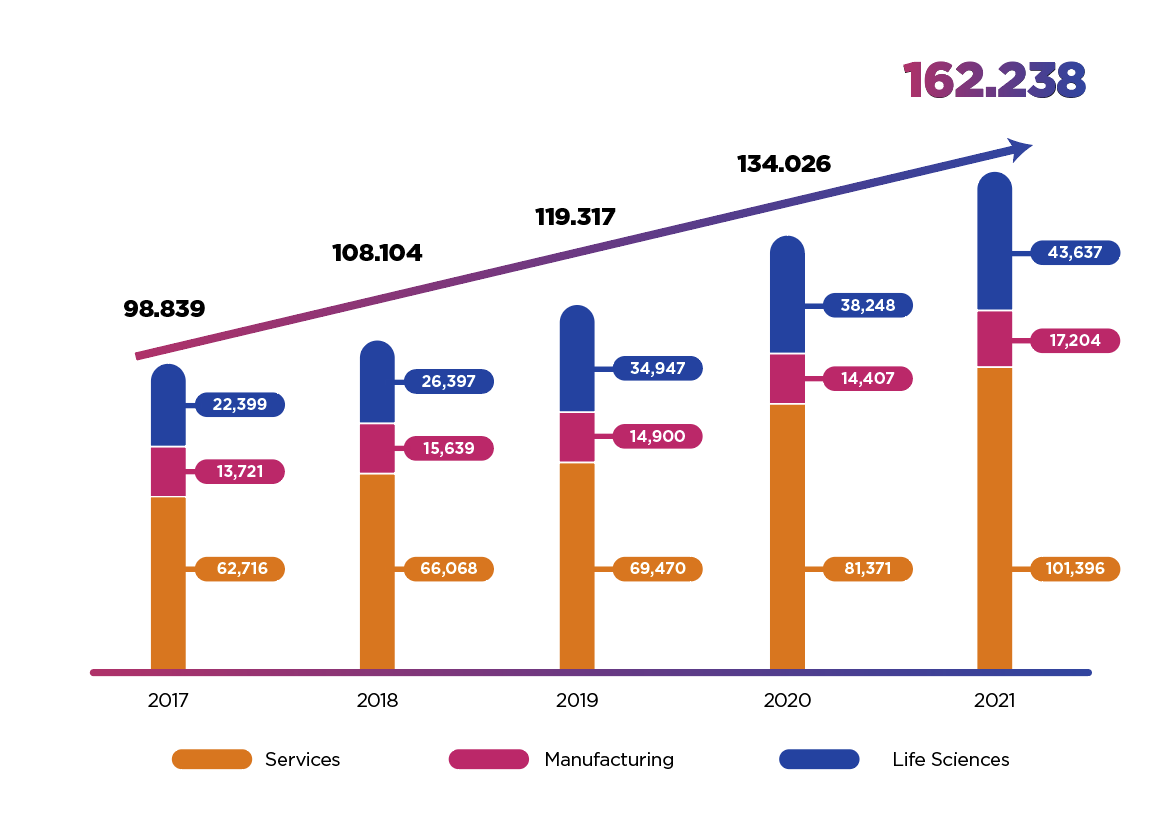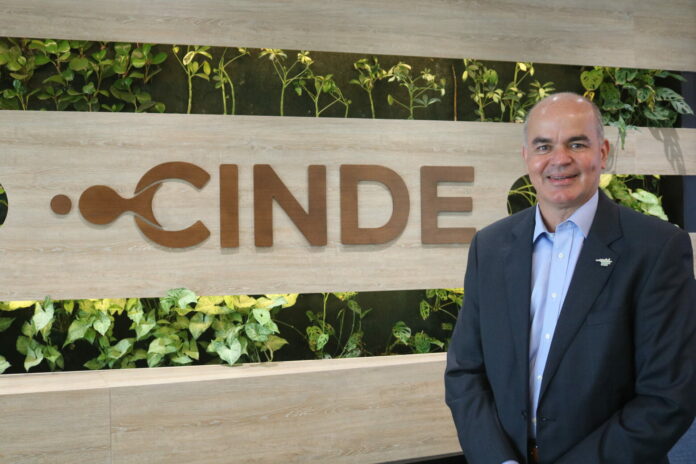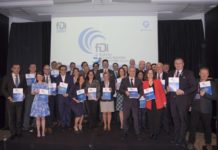Our Editor, Ana Grujovic, spoke with Jorge Sequeira, Managing Director of the Costa Rican lnvestment Promotion Agency, CINDE, on how Costa Rica seeks to position the country as a magnet for companies looking to act according to responsible business conduct and move the needle toward a sustainable Costa Rica.
”According to the FDI Performance Index published by fDI Intelligence in 2022, Costa Rica attracts 15 times the amount of greenfield foreign direct investment that might be expected given the size of its economy. This impressive performance is the result of our value proposition, which revolves around three pillars: people, planet, and prosperity”, stated Mr. Sequeira.
1. The Costa Rican lnvestment Promotion Agency, CINDE, has been operating for almost 40 years now. How did CINDE’s mission change over time and what are the agency’s main objectives today?
From its creation in 1982, CINDE has worked to attract foreign direct investment in order to create formal, quality jobs and contribute to Costa Rica’s social and economic development. For 40 years, CINDE’s mission has been to position the country as a sustainable destination with reliability for investors and strong ties to the global economy, driven by the growth of modern, technologically advanced, and knowledge-intensive industries.
These efforts have helped transform the Costa Rican economy from a traditional agricultural model where the main exports were coffee, bananas, and pineapples to one in which the top performers are medical devices and services.
At present CINDE is counting on attracting companies in nontraditional sectors that can operate outside the central valley such as agriculture, agribusiness, livestock, health services centers, sustainable adventure parks, the food industry, light manufacturing, and services. This will continue to be a priority pillar in our 2023-2026 strategic vision.
Likewise, we will continue our efforts to improve the Costa Rican investment climate, pursuing talent development and coordination among different public and private stakeholders to transform the country into a hub for innovation and development.
2. In many aspects, Costa Rica is a success story in terms of development: it has shown a steady economic growth over the past 25 years. What are the key success factors of the country’s steady growth?
According to the FDI Performance Index published by fDI Intelligence in 2022, Costa Rica attracts 15 times the amount of greenfield foreign direct investment that might be expected given the size of its economy. This impressive performance is the result of our value proposition, which revolves around three pillars: people, planet, and prosperity.
Costa Rica’s talent – its most valuable resource – complements an ideal ecosystem for innovation, research, and development where more than 400 multinationals converge and collaborate among themselves to make this a more prosperous country. This all takes place within the framework of a matrix where 99% of the energy is from renewable sources. Costa Rica’s commitment to sustainable development – a commitment that has distinguished it for more than 60 years – makes it an ideal destination for companies seeking a solution for reducing their carbon footprint and opting for sustainability.
This last factor increasingly constitutes a competitive advantage for Costa Rica, which today is home to more than 20 RE100 companies committed to the use of 100% renewable energy.
3. Costa Rica closed Y2021 with record figures on the number of investment projects attracted as well as jobs created. Which economic sectors attract the highest FDI?
For the sixth consecutive year, companies attracted by CINDE created a record number of 19,725 jobs in 2021, providing direct employment to 162,238 people in Costa Rica, with services being one of the most dynamic sectors.

4.How did Costa Rica reinvent itself and became the Silicon Valley of Latin America?
As mentioned earlier, Costa Rica is a knowledge-intensive economy. At Q2 2022, cumulative service exports were at $5,584.4 million, up by 33.4% from the same period in 2021.
Costa Rica went from having six service companies at the beginning of 2000 to having more than 180 companies, including the leader of the Fortune 500 ranking and some 20% dedicated to the digital technologies subsector. At the 2021 close, these activities employed more than 27,500 people and led service exports with an average of $243 million per million inhabitants – that is, 43% more than its closest Latin American competitor.
This was made possible by the availability of specialized talent. Since becoming one of the few countries in the world without an army, Costa Rica has reoriented its budget towards building the skills of its population. This visionary decision has enabled it to invest 14% of all government spending in education – almost double the average of OECD countries (7.9%). Today, its population ranks #1 in current and future skilled labor force (2019 Global Competitiveness Report).
In recent years, the country has been encouraging youth to build technical knowledge and move towards careers of the future such as web development, data analytics, artificial intelligence (AI), and cybersecurity. As a result of these efforts, and in partnership with Intel, in 2022 Costa Rica became the first Latin American country to have AI as a technical specialty in its public education system.
5. CINDE’s motto Invest with purpose clearly indicates that Costa Rica aims to attract eco-conscious foreign investors. Today, approx. 99 percent of Costa Rica’s electricity comes from renewables. What is the role of FDI in contributing to the achievement of Costa Rica’s sustainable development goals?
In effect, Costa Rica has set sustainability as a priority for its development. In 2016, it became the first country in the world to sign a National Pact to Advance the Sustainable Development Goals (SDGs) of the United Nations.
By investing with purpose, CINDE seeks to position the country as a magnet for companies looking to act according to responsible business conduct and move the needle toward a sustainable Costa Rica.
CINDE has recently launched an innovative tool to measure the impact of companies operating on national territory on the achievement of the SDGs in Costa Rica. The results of this study will be published in 2023, but they promise important lessons and identification of good practices for replicating in other economic sectors. Among the participating companies are global leaders in a wide range of industries such as Intel, Accenture, Coca Cola, Roche, and Procter & Gamble.
6. In May 2021, the country became an official OECD member. How does OECD membership reinforce the country’s goal of sustainability?
Costa Rica agrees with OECD standards and that they should therefore be reflected in investments with a real purpose. The country is counting on institutional strengthening through continuous improvement in public-private ventures, public policy, and business climate for advancing in the knowledge economy and expanding its participation in global value chains.
By becoming the 38th and most recent member, Costa Rica is consolidating its legal security and providing greater confidence to investors in this country.
CINDE finds progress and human development in the spirit of sustainability, so by joining the OECD it is seeking to promote a fairer society while still respecting its ecosystems and natural resources.
7. The World Economic Forum ranked Costa Rica number one in human capital in Latin America, as well as in digital skills of its population. Which employees’ skills are most required by foreign investors?
Some 50% of CINDE’s team is dedicated to helping develop Costa Rican talent and learning the profiles – both technical and university – required by companies. Global mega trends, technologies, and changes have marked the need of all countries to have an increasingly specialized population with STEM skills and multilingualism.
Costa Rica has set itself the challenge of continuing to form this human capital. To this respect, CINDE has set up more than 50 learning paths in addition to finding academic partners and funding for training thousands of people as quickly as possible in order to match the supply of Costa Rican talent to global company demand.
8. Maintaining close relationships with a number of partners in the country is one of an IPA’s key success factors. Who are the main partners of CINDE’s network at home and abroad?
Being a private, non-political, and nonprofit organization, CINDE has worked side by side with 11 government administrations of different political parties. This is one of the key factors leading to its recognition as the #1 investment promotion agency in the world according to the UN’s International Trade Centre.
This stability ensures the development of long-term strategic plans that Costa Rica implements as part of its foreign trade triad. The Ministry of Foreign Trade (COMEX), the Costa Rican Foreign Trade Promoter (PROCOMER), and CINDE thus constitute one of the country’s most successful public-private partnerships.
9. CINDE is a member of the OECD IPA network. In your opinion, what are the main challenges IPAs are facing today and how do you perceive the future of IPAs’ activities?
Given the global talent crisis faced today, investment promotion agencies should redirect their efforts to strengthen their business climate and thus complement their strategies for attracting and assisting companies. This shortage of specialized human capital challenges us to work harder on the supply side rather than the demand side of the equation.
The scenario becomes even more complex when addressing a second challenge: regionalization of the companies operating in the country. When extending the benefits of foreign direct investment to communities in addition to where they are conglomerated, many countries are facing the same paradox. The areas where formal job opportunities are most needed tend to have fewer or none of the talent sought by these companies. To meet this challenge, we are committed to seeking to attract new sectors and implementing strategies to strengthen regional competitiveness.
Find out more about CINDE here.
Read more interviews here
Picture source: CINDE





